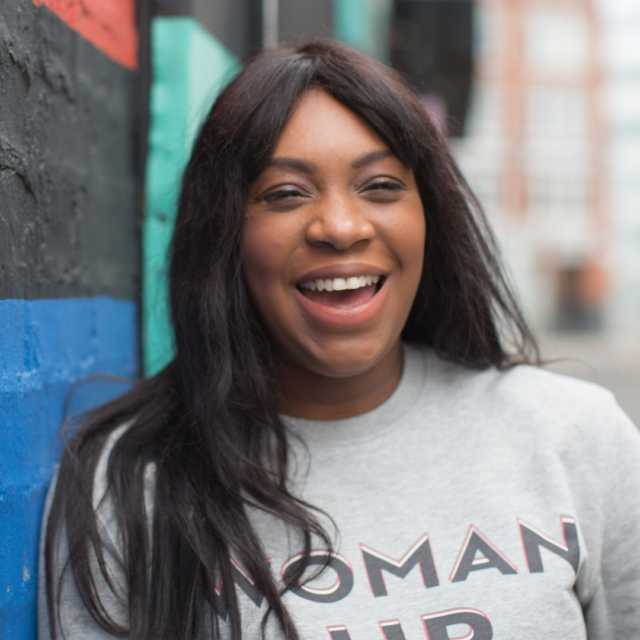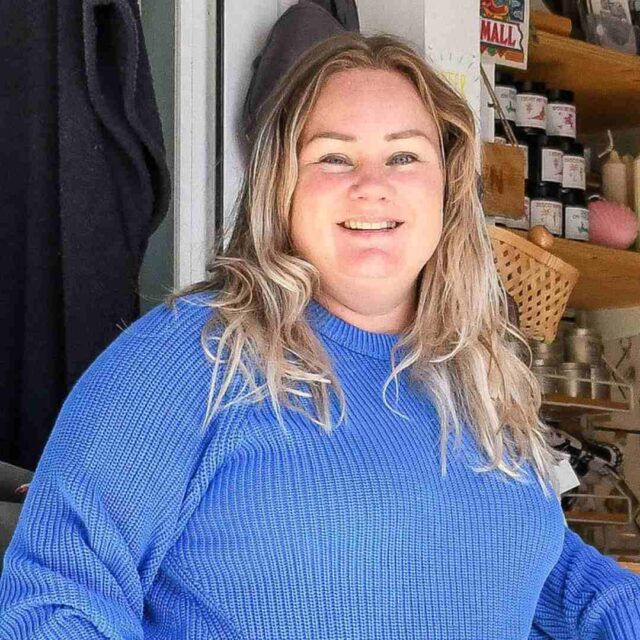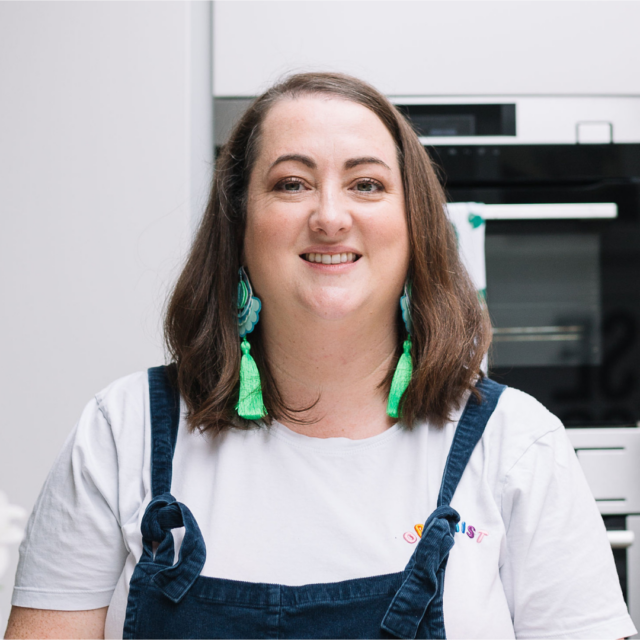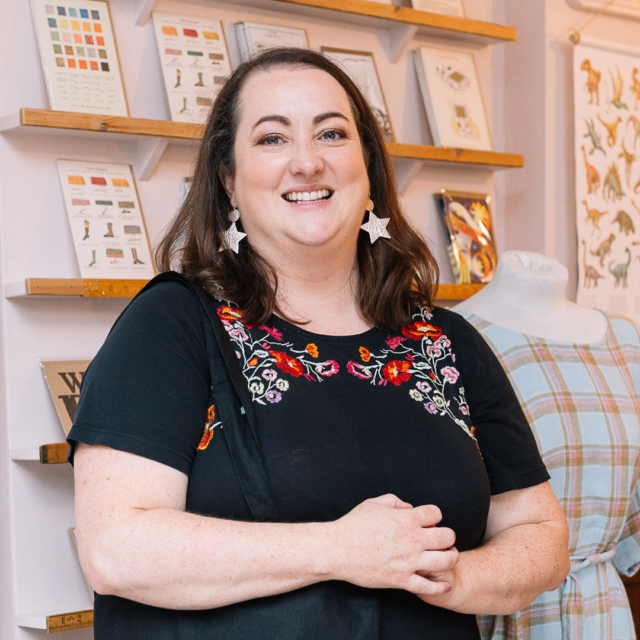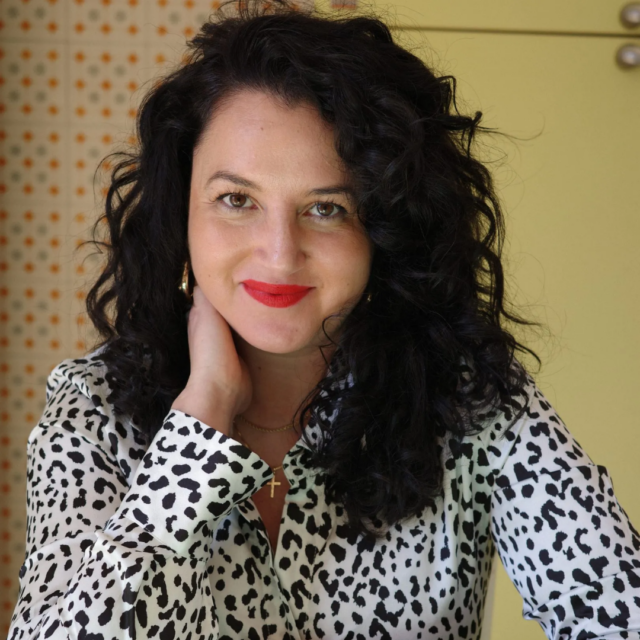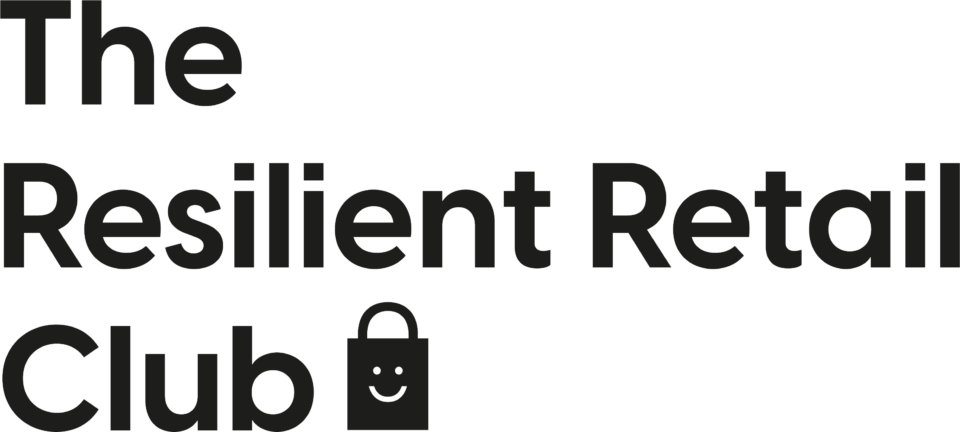How Your Mindset Impacts Your Business with Annabel Gonifas
Catherine Erdly: How does your mindset impact your business? Well, I know for me personally, it has a major impact on what I’m able to do and how I’m able to show up for my business and for my clients. When my mindset isn’t really great. So whether that means I’m feeling less confident in what I’m offering, or maybe I feel like I’m not quite going in the right direction, but all of those things, especially in the early years of running my business were really major factors on how the business did.
And so I knew that when I created my product business mastermind. The fifth cohort, which is kicking off shortly and which has been going for a year now, I knew that I wanted to very much offer the members the opportunity to really delve deeper into their mindset, their values and their vision of success for their business.
Now, I very much sit in the mentor slash consultant space. That means that when I work with somebody on their business, I’m very much looking at the practical elements of giving them support advice around strategy, around business numbers, profitability, structure, and sales strategy. And so I knew I needed to find somebody who I trusted to work with my clients to get great results for them in being able to have a safe space for them to talk about their mindset.
Enter Annabel Gonifas, who is a coach who I’ve personally worked with myself and who is amazing. And I’ve known for several years through another business mastermind that I was part of, and I knew that she would be absolutely perfect. And I get such great feedback from the mastermind participants about working with Annabel.
She is really great. Somebody said she’s great at reaching into your head and pulling out what needs to come out in a good way. And today we’re going to dive into the importance of mindset in business, as well as talking about some of the tools that Annabel likes to use, including things like personality strengths profiles.
Welcome to the Resilient Retail Game Plan, a podcast for anyone wanting to start, grow or scale a profitable creative product business with me, Catherine Erdly. The Resilient Retail Game Plan is a podcast dedicated to one thing, breaking down the concepts and tools that I’ve gathered from 20 years in the retail industry.
and showing you how you can use them in your business. This is the real nuts and bolts of running a successful product business, broken down in an easy, accessible way. This is not a podcast about learning how to make your business look good. It’s the tools and techniques that will make you and your business feel good.
Confidently plan, launch and manage your products and feel in control of your sales numbers and cashflow to help you build a resilient retail business.
Welcome to Annabel Gonifas
Catherine Erdly: Annabel, thank you for joining me on the podcast. Do you want to start off by telling everyone a little bit about you?
Annabel Gonifas: Yeah, sure. Catherine. Thanks so much for having me. It’s a real pleasure to be here today with you. I am a professional coach based down here in South Devon, and I work both face to face and online. And I’ve been a coach for a number of years, having run my own businesses in the past. I really, saw how the mindset plays out in business.
And actually my background, my family have been in coaching for a while in business as well. I’ve really seen how those tools and techniques that you can use can really help you strive forward. So that’s why I decided to train myself.
I’d
Catherine Erdly: Amazing. And we’ve known each other for a number of years now. And it’s always such a pleasure to collaborate with you.
What are some of the ways that small business owners are holding themselves back
Catherine Erdly: You mentioned the importance of the mindset, but what are some of the ways that small business owners are holding themselves back.
Annabel Gonifas: I’d say that three core things. One of them is around the limiting beliefs. To me, that’s massive. We put these limiting beliefs on ourselves and it’s often to do with old narratives. So it’s really to get to the core of those limiting beliefs. And that’s what I’ll really try and do through support and challenge, but we’ll dive quite deep in those.
And I think in the one to one sessions, people are able to feel quite vulnerable with me. It’s all safe. It’s all non judgmental and it’s all really confidential. So it’s really deep diving on those things that they might have not realized is a limiting belief, but actually through the conversation that we have, it’s really getting to that pinpoint, to that core of what it might be.
So that’s definitely one of the keys. I’d say there’s something around values as well. So really understanding what their values are, what their business values are, and also understanding strengths.
Catherine Erdly: Okay.
Annabel Gonifas: you’ve got those, sorry, go ahead
Examples of some common limiting beliefs and how they might play out in your business
Catherine Erdly: no. I was just going to say, so coming back to the limiting beliefs, can you give us some examples of some common limiting beliefs and how they might play out
Annabel Gonifas: Yeah. It’s hard because it’s all confidential. I don’t to give too much, but it’s. It’s,
Catherine Erdly: or some themes maybe? Yeah.
Annabel Gonifas: Yeah.
it’s those, the theme is the narrative that they’ve told themselves or that they’ve been told for years. So as we grow through life we like sponges and we listen to what people tell us.
So it might be something from years ago, often from a playground, from the school. from how you molded yourself at school through university or siblings or parents and because it’s coaching it’s not therapy or anything so we don’t go we go back but we don’t go it’s not a therapy session but we will try and find If that’s what we’re working on and that’s the pain point, we’ll try and find where that root cause came from.
And then you you release it because you’re essentially seeing it in adult eyes. And what you can do is really check what you heard as a child. You can check that kind of, is that a fact or is that just assumption I made with my like 10 year old ears on that I heard that I’ve been. created that narrative around myself.
And therefore that’s what I assume. And that’s how I’m turning up age 30, 40, 50, however old you are. And that’s my actual belief. And so you’re able to free up those beliefs. So that’s some of the work that comes up as an example.
I think there’s quite a big piece around, which I know we might dive into later, but around the strength side and actually whether people have created a narrative, whether they’re an introvert or an extrovert, for example, and that can really play a part in business in terms of how you communicate with others.
But also, especially if you’re running a small business, what I found especially coaching your mastermind is because if they are fairly small or working with a smaller team it’s whether you found yourselves just working alone, but actually you get your energy from other people.
All the other way around, if you’re in a very client facing environment and if you’re, say, if you’ve got a bricks and mortar shop and you’re in the shop all day, why you might love with a passion everything that you do, but actually you get absolutely exhausted. So we talk quite a bit about, if it’s relevant, around introvert and extrovert and how you can re energize yourself because as a business owner, it’s about getting your energy back up.
And working out where your best energy is so that you can keep on performing at your best and you’re not feeling utterly drained.
Catherine Erdly: Yeah. That’s such a good point. And that’s why I love the strengths work. And I love all of that. And the reason I include it in the mastermind is that I found for myself personally, understanding more about me and how I work has been a real game changer in terms of my own business.
Why do so many small business owners struggle with mental blocks when it comes to running a business (that they didn’t seem to have in a 9-5)?
Catherine Erdly: One of the things that I often kind of wonder Is that sometimes it feels like the process of starting a business, Of creating something, of putting it out there in front of other people and almost saying will you buy this from me?
It’s It’s something that brings up all of these different elements in a way that nine to fives or, let’s face it, lots of us worked longer than nine to five. But, it’s challenging in different ways, but I feel like there’s a lot of stuff you could just slightly repress or just not even deal with.
But when you’re running a small business, it’s like all of a sudden you have to confront all of these different things that maybe you, you’ve not been dealing with.
Maybe.
Annabel Gonifas: Dev, absolutely.
Catherine Erdly: But why do you think that’s, why do you think that is, and why do you think so many small business owners actually do struggle then with that?
All of the things like motivation or procrastination, or just some of these mental blocks when it comes to running a business?
Annabel Gonifas: Well, I think you’ve hit the nail on the head because there’s so much of our ego that gets put out there and ourself. And it’s just, it’s, you put your whole self out there when it’s your own business. It’s like your it’s your brain. It’s you’re, you. your baby, your child. And therefore, there are so many different things at play.
And I think once you’ve really understood why you’re doing it, so why I often talk about the layers of the onion I used to be a chef. So to me, it makes sense. I love talking about onions, but about, it’s about the real core purpose and identity of what you’re doing and why you’re doing it. And when you connect to that and your values, They’re your North stars.
So whenever you’re feeling demotivated, you find you’re procrastinating, which in fact is one of the key strengths or weaknesses, should I say, of one of the personality types, it’s really understanding what you’re doing. Why are you showing up? You might love your product, but why are you doing it?
So it’s finding that kind of deeper level purpose and then how you want to show up. What are your values? How are you going to put that out to the world? So you’re not. What I find speaking or listening to people is there’s a lot of should be’s, I should be doing this and I should be doing this and I should be doing this.
And of course there’s so much noise out there in, in the ether at the moment. There’s so much noise. It’s really focusing on why you’re doing it. What your purpose is, and keeping core to your values and then just cracking on with it. Then it’s the how and the what. The how and the what is often where people start.
Catherine Erdly: Yeah,
Annabel Gonifas: And especially when they want to make change, they’re like, well, I’ll change the processes or I’ll change the structure or I want to make more money so I’ll just keep on adding a new line or I’ll create something new. It’s no, we need to draw back. That’s the outcome of what we’re doing, and that’s the bit that you know how to do. That’s your genius. Anyway, but we need to get back to the why and the purpose around it, because they’re the things that will keep you on track and also keep you swimming in your own lane. Like it’s great to compare, it’s great to understand where people are in the market, et cetera, et cetera, but your genius and where you will connect with those customers., is when your doing it your way.
What can procrastination tell us?
Catherine Erdly: Mm, Mm hmm, Yeah. That’s such an interesting point. It makes me wonder about procrastination then, because we talk about procrastination as a negative, and I know we’re going to talk a bit more about strengths later, but I sometimes think procrastination, and maybe this is just my own personal experience, sometimes procrastination comes when I’ve strayed off.
Or I’m not feeling clear about something and, or it’s almost like a bit of an early warning sign that I’m not really aligned for whatever reason. It’s, the way I’m working or the direction I’m going or things like that just doesn’t feel quite right. But you can’t almost articulate that.
So your brain just goes, I’m just gonna, I dunno, tied to my office or
sit and so
Annabel Gonifas: going to put it on my to do
Catherine Erdly: yeah,
Annabel Gonifas: 12 months.
Yeah. I’d say so. I think if something’s motivating you, if something kind of ticks all the boxes into your purpose, into your why, into your values, so I use a profit, joy, value kind of triangle. Um, So if it hits your values, so whether they are three to five core values, which is what I often worked with people on if it hits that, if it’s making you profit, which I’ll often say, Catherine’s helping you with that, where are we focusing with that at the moment?
So I feel like you’ve got that, you’ve got a handle on that bit. And then it’s the joy. Is that actually giving you joy and when you’ve got that balance, that triangle, It’s going to work. You’re going to be motivated, but if it’s not giving you joy, or if it just feels like you say that sense of like, Oh, I could be, I could be doing this, but it’s like, do you need to be doing it?
Is that actually aligned with your values? And also, is it driving you profit? If it’s not, then you might not be motivated to do it anyway. So it’s got to, it’s got to hit those three things. And that really helps.
Catherine Erdly: Yeah, that’s such a good way of looking at it. I love that idea of the triangle. I think that’s such a good way of looking at it. And I think it’s important to ask ourselves these things because you’re right, we all know what it feels like when you’ve got that fire in your belly and you just, I’m absolutely determined to do something and you’ll just put all of that time and effort and energy.
And I think there is a certain element to which you can’t be in that mode forever. And I always love that phrase, you know, no flower blooms in every season. So there is some times when you energetically need to retract a little bit and rest and recuperate. But, ultimately, I often feel with business owners, they will berate themselves for procrastinating.
But actually what’s happening is that someone, somewhere, somehow they’re being told very clearly by their subconscious something’s not right here. So it does actually help to have that time to stop and go, well, am I procrastinating because I’m burnt out or is it because it’s just not aligned? And I love that idea of the triangle.
Annabel Gonifas: definitely. I think procrastination, if you go on to TED Talks, there’s all sorts of things about procrastination. So there’s some is it Simon Sinek? Someone does a really good TED Talk on it, but I think you’re right. It’s so many levels. It probably means something’s not quite right. And it also means sometimes going, if you go into your strengths and maybe you’re just not approaching it in the right way. So when you start understanding your strengths, and for example, are you a real spreadsheet person?
Are you a real mind mapper? Are you like, how do you actually need to even start this project in order to get it off the ground? Sometimes it can be that really small tweak, or there’s just a tiny barrier. Again, it might be linked back to a limited belief where you’re like, Oh no, but I just can’t do that part of it.
You’re like, well. You probably can let’s look into it. So it could just be something really small that you need to look at. So I agree procrastination. I guess it’s just some, as you say, it’s that, it’s your subconscious just slightly holding you back. Otherwise you would be going great guns. So to question and reflect on why that is, is very sensible.
What is personality profiling? How does it work and how is useful in your business?
Catherine Erdly: So you mentioned personality profiling and I was keen to include this as part of the mastermind because I personally have used it in my business, thanks to you, and I found it so fascinating.
So can you share a little bit more about this tool, how it works and how you use it?
Annabel Gonifas: Yeah, sure. So it’s really a simple tool that has been used in big corporations especially for years. It’s similar to the Myers Briggs, similar to Insights. I personally use Clarity 4D which is a really easy way to understand your personality type. It’s pretty easy. It’s like insights. It’s based on colors and all of these programs are all based on Carl Jung’s personality type theory.
So that’s where it stems from and what happens is I send you a link. There’s 20 questions, which can feel you just got to answer. Which one is least like you? Which one is most like you? And then you have to answer the two in the middle, which people think, Oh, I don’t know. I’d neither of those, but you have to do it in order for the algorithm to pick up your personality type.
So there’s 20 questions and that’s all it is. It takes about 15 minutes and you have to answer as intrinsically as you as possible, because if we’re thinking about who we want to be or who we should be, or who other people think we are. we’re not actually getting back down to our base camp. So it’s really understanding your base camp.
So you answer these 20 questions and then I send you a pdf which is about 12 pages long and within that pdf you’ve got 100 sentences which are all written about you. And it is in black and white and it’s absolutely amazing for lots of people how clear it is and how much it is like you. It’s amazing having answered these 20 questions, how you can then read this profile about you.
Some of the times when people read them, they think, Oh no, that’s not me. And then they’ll say to me, But then on reflection, it was really hard to read because actually it was me and they’re the really good bits because they’re like the blind spots where we’ve just been hiding them away. So you’re looking at your strengths, but you’re also, which is super important and often when people are reading through it, they like glance over their strengths.
They’re like, Oh yeah, but that’s just me. That’s just me. And everyone does that. And you’re like, No, that’s not me. No, that is not what everyone does. That is your strength. And that is again, your genius. That’s where you really excel because 95 percent of the world don’t do that. So really hone in on that.
And then it also, as I say, it highlights your blind spots, which you can either decide to work on, or if they’re just not serving you. It’s all about awareness and self awareness and how you show up and also how other people’s personalities show up
Catherine Erdly: Mm hmm.
Annabel Gonifas: you. So whether you’re communicating with them or whether you’re having to deal with them, whether you’re their boss, or if it’s even just trying to if I go back to that Excel spreadsheet and a mind map, if you’ve got someone, if you’ve got a VA working with you, And you just use Excel spreadsheets and it can’t, it doesn’t, it just doesn’t really go into her head.
She can’t use it. You can start to adapt or she can, you can teach her how to adapt or et cetera.
Catherine Erdly: Yeah. And
Annabel Gonifas: just helpful on many levels. Yeah,
Catherine Erdly: doing something not quite the same one, but I remember in a corporate setting, I did this and it was the, I think Myers Briggs, and I was one, you know, and that’s kind of a grid. And then I was one corner of, I would say, let’s say bottom right, and my boss was top left. And I just thought that explains a lot.
And
Annabel Gonifas: And it goes into marriage and families and parents and your friends are like, Oh wow. Yeah, no, I can definitely see that in those other people. the So yeah. Go Sorry, I was gonna say the nice thing about the Clarity 4D as well is you end up with this sort of colour map as well with different types of strengths.
Yeah, absolutely. So you’ve got your, within your PDF, you’ve got your radial graph. So you get a percentage of how much you are in each color. So for instance, you might be quite high red, which is super driven. It might be quite low, which is the analytical side. And so it just gives you a really clear indication of where you show up.
And also sometimes it’s where you need to dial down. So those strengths can be until they’re pushed quite far. And then they can actually be like overexerted strengths, which actually say, for example someone who’s highly yellow is really creative, can come up with lots of ideas, but actually that can quite quickly turn into chaos and franticness, and they can leave this like trail behind them.
So it’s like when to dial that down. Just before it gets over the edge and the same with, say, for example, if someone’s really highly blue in analytical and data driven, it’s like that is really important. But if that’s all you’re focusing on, you’re going to be slightly missing everything else. And if we go into the greens, which are concerned and really supportive and loyal, conscientious, that’s often where that procrastination can kick in.
So if we overexert that. If we go into too much of that, then we become indecisive and we can procrastinate just purely because we can’t quite take action because we still need to look at all the options. So in business, it really helps. And I think what I love about the Clarity 4D profile is that it’s very much, it’s for charities, it’s for youth, it’s for small businesses, although big corporations use it as well, is It’s very much aligned with that, so you can be quite creative with it.
It gives you where you are at base camp so that you can then develop and discover and improve. And it’s like you said, it’s like a map. It is. It’s like an atlas of who you are and it gives you a language around it.
Catherine Erdly: I think as well it’s also important because a lot of the time I think small business owners I mean I think people in general but I think small business owners can have a tendency to be really hard on themselves.
So it’s it also somehow takes a little bit of a personal element. I know it’s about you and But when you almost see the categories that you fall into, so for example, like you said, if somebody is very highly green and they don’t make decisions easily, then it’s, it takes that away from feeling like, oh, I’m just so indecisive.
I’m just, It, it stops you seeing it as much as the flaw as a, as an element of your personality, which also has other positives to it.
So then you can say, well, yeah, I might be more in this, but actually that’s why, that’s also why I’m such a good friend, such a good,
Annabel Gonifas: mm.
Catherine Erdly: such strong, deep connections in my relationships.
So I think it, it’s a lovely way of understanding more about yourself, but also seeing is a positive is something that you can really. Understand your strengths and that’s why I love it. It’s all about strengths profile. It’s not about picking holes it’s about understanding how you are and how you like to operate because it’s very hard if you build a business that is built around a way you don’t like to operate Yeah,
Annabel Gonifas: is, and that’s often why people will find themselves in working for someone else, where they suddenly think, I just, this is all just feels really hard because even it’s their systems and processes, but then that might’ve been what they learned in a different business or setting. And then they bought that into their own setting, but now they’re their own boss.
So they’re able to do it their way. So as you say, you’re absolutely right. It’s about finding those strengths and then really working and molding your business around your strengths and delegating where necessary. And it really helps to focus. It goes back to swimming in your own lane. It’s very much all part and parcel of that kind of the values, the why, where you are.
Base camp which again with small business owners, I think it’s often forgotten because you’re producing things And it’s just taking that time back to going. Okay. Well, i’m a human and i’m running a business And that’s a kind of exchange of goods between one person And another person so i’ve got to understand who I am So that I can understand how I then deliver to other people and connect with them.
It’s that really subtle layer of business that we don’t often dive into, but it’s super important.
Catherine Erdly: But I think it’s super important and I also think it’s often the hidden culprit behind a lot of problems that people have in the business. And that’s what I love about this. I sometimes talk about it like an invisible wall. Like you’ll run into this thing and you’ll be like, I don’t know why I can’t make myself do this.
I know I should do it. Like you say, the shoulds. And it’s you can’t, it’s very hard, your subconscious is very powerful and it’s saying this isn’t aligned, this isn’t right, but yet, unless you actually drill down into it, you can’t necessarily unpick where you, yeah, you can’t unpick what’s going on in the business until you’ve actually understood your own motivation and oh, okay, this isn’t my value is all about sustainability.
And this doesn’t feel very sustainable. This doesn’t feel like I’m true to that anymore or whatever it might be. And I think it’s so important because The work that I do as a consultant, as a mentor, it’s very practical. It’s very much, this is the strategy. This is what we’re doing. Very numbers focused.
But I think that unless you address some of the other stuff, which, is seen as softer skill side, then you
actually aren’t going to get anywhere. So
I do believe it’s really important for sure.
Annabel Gonifas: I think that’s what’s really good about the kind of the link and the collaboration between the two, because as you say, people can understand the theory and they understand the practicality of it and they can see how they can do it. Produce results from it. But if this, and you often feel it in your, literally in your gut, you can often just feel it in the top of your kind of stomach area where your diaphragm is.
And if that’s just not feeling quite right, it’s not that the processes and the product productivity aren’t right for your business. It’s just, there’s something there. That’s not that, that, as you say, hasn’t been released. It hasn’t it, or it’s just not, you’re not doing it in the way that makes sense to you.
It’s like all the habits and, the behaviors of how we actually, how we plan, how we organize, how we go about life, how we communicate, how we behave, all of those we are, we have learned. And so once we start looking at that, it can be the tiniest tweak. It can be the tiniest aha, no, that’s it.
Okay. And then they can continue. So it’s that collaboration and partnership that I love.
Catherine Erdly: Yeah, for sure. And I think that’s the thing to say as well. It doesn’t always mean that you’re on completely the wrong path if your gut is saying something not quite right here. And I certainly know, it’s something I’ve learned in my business over the last six years is to listen to that and to sit with it.
And to go, okay, what is going on? And And like you say, it’s not always oh my goodness, what am I doing? I actually want to be doing something completely different. I’m going to throw everything up in the air or burn it all down.
Sometimes it’s just you know what? I really need to make sure I’m finishing on a three on a Friday because that’s really important to me.
And I haven’t been doing it the last few weeks or something like that. Not that I do finish at three on a friday. I have to keep.
Annabel Gonifas: but you’re so right, because for some people, if you go back, if we it’s about reverse engineering, you’re like you’re why, your purpose. And for some people, running their own business is about having the freedom to finish at three on a Friday. And that might be why they came out of employment in the first place, in order to run their own business.
And they’re very good at it. Making mugs or something like that. But that’s essentially their purpose of what drives them in their business is making sure they finish it to be on a Friday. But as you say if everything’s got lost along the way and the reverse engineering hasn’t been happening and something’s chunked to the side and you don’t feel, then it will be that kind of gut reaction that you’re feeling.
You’re like, okay, I get how I can do all this, but it’s still not quite hitting what I essentially wanted to do in the first place. So it’s really a case of zooming out, looking about what’s happening, going into detail and then making a plan so you can move forward with like purpose and alignment and confidence.
Catherine Erdly: And it can be quite transformational as well, wouldn’t you say, when people almost like I sometimes think it’s like when you’re looking through binoculars and then all of a sudden everything comes into focus and you’re like let’s do this, like I can go for it now. And it’s,
Annabel Gonifas: Yeah. That’s a really lovely analogy. I love that. That’s exactly what it’s like.
Catherine Erdly: Okay, Annabel, thank you so much for joining us today. It’s been an absolute pleasure as always to talk all things business and mindset with you. And of course, if you’re listening and you think I’d love to have this opportunity to find out more about my personality and to have a safe space to dive into it.
And Annabel is part of our fabulous mastermind. And yes, been what a that we’ve been working on it together now. Yeah, and it’s been an excellent, and you said people get such great feedback from the participants about working with Annabel. Yeah, get in touch.
Annabel Gonifas: Oh, thank you, Catherine. It’s always just such a pleasure to work with you and also to work with all the masterminders coming through. What I really love is all the knowledge that they have from you and the kind of confidence and watching them improve over the six months in terms of their practical tools of their business, and just really understanding.
The structure of their business. That’s what I love to see as well. There’s always so much improvement by the time like our third session comes. It’s just fab. So thank you so much for
Catherine Erdly: Oh, thank you. Thank you so much for listening to today’s episode and thank you so much to Annabel for joining us and sharing your thoughts. It was a fascinating conversation. I hope you enjoyed it.
Do take a moment if you can rate and review the podcast. It makes a huge difference so you can rate and review it inside Apple Podcasts or you can rate it inside the Shopify app. And of course, if you have not yet subscribed or followed the podcast, then please do so it will mean that you’re the first to know about every new episode that comes out each week.

